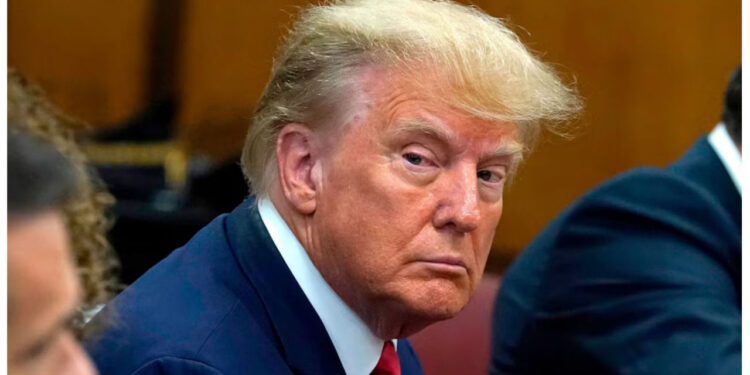Jury selection is set to commence on Monday for Donald Trump’s New York hush money case, marking the start of his initial criminal trial out of the four. These charges stem from allegations of a cover-up involving a $130,000 hush money payment made to adult film star Stormy Daniels prior to the 2016 presidential election. However, the latest polls indicate that a guilty verdict would not significantly impact the upcoming November elections.
A YouGov poll conducted after a Manhattan grand jury indicted Trump on 34 felony counts of falsifying business records last March revealed that the majority of Americans, 52 percent, either strongly or somewhat supported the indictment. In contrast, 32 percent opposed it.
According to the latest YouGov/Economist poll, around half of Americans maintain their belief that the former president is guilty of the charges. The public opinion of the case has remained relatively unchanged in the months since. The poll revealed that 48 percent of adults agreed that Trump falsified business records. However, as expected, opinions on the matter were divided along partisan lines. A significant majority of Democrats (87 percent) believed in Trump’s guilt, whereas only 35 percent of independents and a mere 14 percent of Republicans shared this belief.
According to a recent poll conducted by The New York Times/Siena College, likely voters were asked about their opinions on the verdict in the hush money trial. When asked what they believed the verdict should be, 46 percent of respondents stated that they believed Trump should be found guilty, while 37 percent believed he should be found not guilty. These results largely aligned with the respective party lines.
According to a March poll conducted by Quinnipiac University, even if the Manhattan trial were to lead to a conviction, the majority of registered voters, 55 percent, stated that it would have “no difference” in how they would vote in the presidential race this November. Only 29 percent indicated that they would be less likely to support Trump as a result of a conviction, and it’s worth noting that a significant portion of this figure consists of individuals who were already unlikely to vote for him. Among Democrats, 49 percent said that a conviction would make them less likely to cast a ballot for Trump.
According to a poll conducted by Ipsos/Politico Magazine in March, it was found that a conviction could potentially have a negative impact on Trump’s support among independents. The survey revealed that 36 percent of independents claimed they would be less likely to support Trump if he was found guilty. However, it is worth noting that this percentage was still 8 points lower than the portion of independents who stated that a conviction would have no effect on their voting intentions.
Among Republicans, only 9 percent indicated that a conviction in the Manhattan trial would diminish their support for Trump, while 34 percent said it would actually strengthen their backing for his presidential campaign. This comes as no surprise, as Trump’s loyal supporters have consistently demonstrated unwavering loyalty, regardless of the circumstances. It is likely that those who harbor doubts or reservations about Trump have already distanced themselves from him.
In the past year, the former president has faced three additional indictments, which many Americans consider more significant than the one in New York. A recent Ipsos/Reuters poll revealed that 65 percent of registered voters find the hush-money-related charges to be “very” or “somewhat” serious, trailing behind the other three cases by 5 to 10 points. Similarly, a YouGov poll from January showed that 56 percent of respondents ranked the hush money case as the least important among the four indictments. This majority opinion was consistent across various demographic groups, including party identification.
Pollsters are now shifting their focus to Trump’s legal troubles as a whole, rather than examining each individual case separately. Instead of asking about the alleged hush money cover-up specifically, recent surveys have started asking questions about Trump’s overall criminal cases since January 1st.
According to the Ipsos/Politico poll, about half of Americans believe that Trump is guilty in all four cases. This finding suggests that there is a tendency to lump the different cases against Trump together. Interestingly, the opinions on the indictments seem to align with partisanship, indicating that people’s beliefs are influenced by their overall feelings towards Trump.
Americans are divided on the fairness of the charges against Trump and whether they are politically motivated or not. A poll conducted by AtlasIntel in February revealed that 49 percent of registered voters believed the charges were politically motivated, while 46 percent believed they were driven by a genuine interest in upholding the law. When looking at the breakdown by party affiliation, more independents leaned towards the belief that the cases were politically driven rather than being based on legitimate legal concerns.
According to a poll conducted by YouGov/Yahoo News in March, 63 percent of adults, including 38 percent of Republicans, believe it is important for voters to have a resolution in Trump’s legal issues before the upcoming general election. Regardless of their desired outcome, voters express skepticism about the possibility of Trump serving time in prison. A survey by Civiqs/Daily Kos in March revealed that 60 percent of respondents believed Trump would never be incarcerated for any crime, while only 11 percent thought he would (29 percent were unsure).
Polling data on the New York trial, as well as the other three indictments, clearly shows a sharp divide along party lines. However, it is unlikely that a guilty verdict would significantly impact Trump’s standing among independent voters. The intense political polarization surrounding the former president suggests that any major shifts in voting patterns are highly unlikely.

